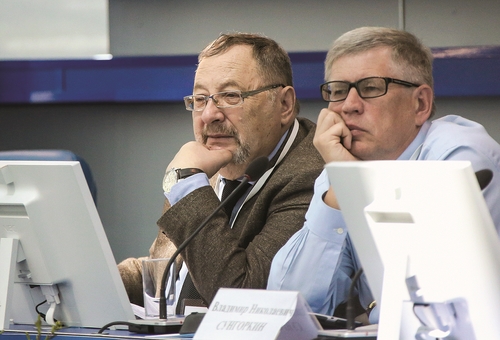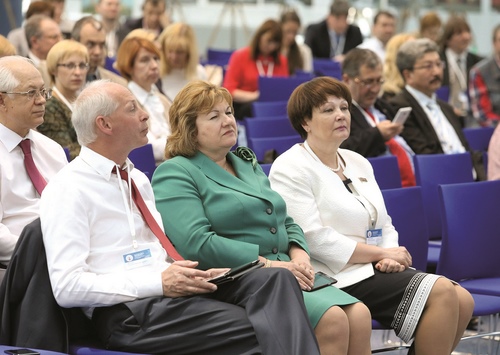
Representatives of two-dozen countries have joined media space experts in exchanging ideas, discussing media related problems and, naturally, strengthening cooperation. Belarus’ Information Minister, Lilia Ananich, delivered a speech at the Forum’s plenary session, stressing, “At present, the role of the media is huge. New information technologies are a great blessing but also bring challenges and threats.” She added that media discussion of conflict and war must be handled carefully, with reverence for human life, world order and neighbourly relations between nations.
Every year, the significance of the common information space is increasing, as noted by the Chairman of the Executive Committee and the CIS Executive Secretary, Sergei Lebedev. Speaking before the plenary session of the 11th Belarusian International Media Forum, he stressed that the Internet has become an important source of information and that some people no longer watch TV or read newspapers. “In this respect, cooperation in the field of information is truly important. Objective coverage is vital. People’s mood depends on what they see on TV and on upon what they hear,” Mr. Lebedev said.
Sensational reporting can replace the pursuit of objectivity and truth in journalism, asserts the Editor-in-Chief of ‘SB. Belarus Segodnya’, Pavel Yakubovich. He emphasises that some journalists fail to properly consider the impact of their work, wishing only to capture attention, whatever they may tell themselves. He adds, “Through their frequent thoughtlessness, they stir conflicts, which dangerously smoulder in people’s minds.”

The overwhelming swathes of information present a threat, since information can be false and destructive. How should we filter these elements and save people from harm? Is it necessary to place bans or enhance media literacy? We cannot sit idly by.
Russia and Belarus will cooperate in fighting manifestations of terrorism, extremism, drug addiction and child pornography on the Internet, notes Russia’s Vice Minister of Telecom and Mass Communications, Alexey Volin. He noted that the accepted plan of work to create a common information space for the Union State provides for collaboration in several directions. According to Mr. Volin, the only way to reach an audience and readers is to provide high quality, interesting materials, across all themes. “Even stories about a state figure should be written well, so that readers keep the page open on their screen,” Mr. Volin stresses.
Belarus and Russia enjoy great opportunities for collaboration between news agencies, and radio and film production teams. Mr. Volin believes that approaches to training of journalists must change, since university graduates sometimes lack the necessary skills for the sphere of modern media. He has suggested that a professional certificate may prove more efficient than a special higher education diploma.

Professionalism is the major criterion for journalists’ work, as noted by heads of news agencies and participants of the Summer School of Journalism, which took place simultaneously with the 11th Belarusian Partnership for the Sake of the Future Forum.
Is a truly unified global information space possible, with cultures and regional editions amalgamated? “Preserving national identity is very important to many people,” argues Armenpress News Agency Director Aram Ananyan. “Global variety is impossible without each unique fragment of the cultural mosaic. Each country and language should be revered. New technologies can actually help us display our traditional values, in all their variety.”
Few would argue that developing modern technologies exerts significant impact on the information sphere. “Technologies dictate everything but they can’t replace journalists: robots cannot write information. At the same time, there’s much information and we must distinguish the key facts among the wider noise. It’s a true challenge,” Mr. Ananyan adds.

According to the Head of the CIS and Baltic States Department at the TASS News Agency, Boris Grushin, news agencies remain the leading source of news, not only for domestic but foreign consumers.
The General Director of the Belarusian Telegraph Agency, Dmitry Zhuk, has warned novice journalists that ‘anyone can start a blog, attracting users, without grace of style’. It’s a challenge for professional journalists to stand apart from the flood of information on social networks, where everyone is ‘an editor.’ He is convinced that professionals are the ones with the exclusive skills.
There’s no doubt that the 11th Belarusian International ‘Partnership for the Future’ Media Forum, and the ‘Mass Media in Belarus’ exhibition have provided a major discussion platform. The events included presentations of editions and media expertise sharing, seminars, round table discussions, the Summer School of Journalism and acquaintance of guests with Belarusian sights. The Forum is a perfect venue for defining modern media trends. It has now ended, but cooperation shall continue, with joint projects, partnerships and the seeking of consensus (rather than aggressive showdown). These are the goals to which all participants aspire.
***
The landmark media events, the 20th ‘Mass Media in Belarus’ international specialised exhibition and 11th Belarusian International Media ‘Partnership for the Future’ Forum, were attended by more than 300 experts from over 20 countries. The creation of international media-content and information security were key topics for forum participants. According to experts, journalists have a determining role to play in settling these tasks.
By Vasily Kharitonov











